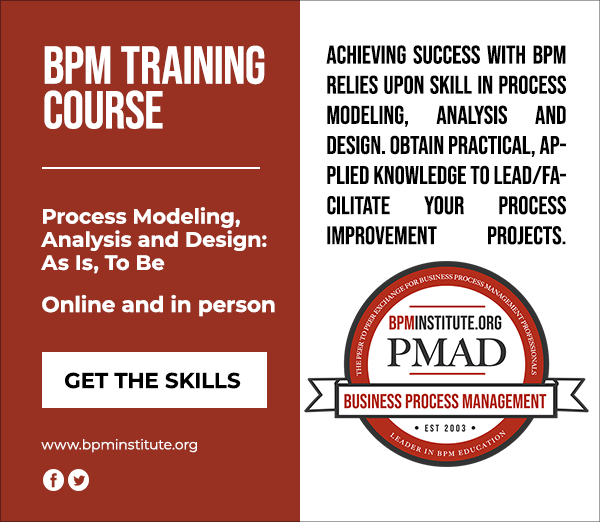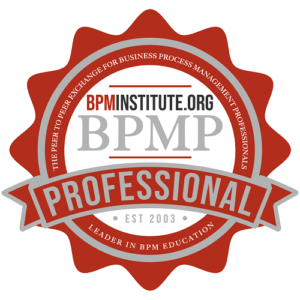
Process Modeling, Analysis & Design
Course Availability
Description
Process Modeling, Analysis & Design – Face-to-Face
$1,195.00
Achieving success with BPM relies upon skill in process modeling, analysis and design. This course equips you with the practical, applied knowledge to lead/facilitate process improvement projects.
Achieving success with BPM relies upon skill in process modeling, analysis and design. This course equips you with the practical, applied knowledge to lead/facilitate process improvement projects.
Modeling, analysis and design skills are indispensable to BPM success. In this course you will acquire a solid understanding and develop skill in practical techniques for process modeling, analysis and design. Beginning with a section on modeling, you will gain insight on how to depict business processes via maps and models in order to prepare for the analysis and improvement of business process performance.
You will learn the significance of creating the right context for process modeling and the definition of clear boundaries. Through a case study based approach, participants learn how to lead/facilitate modeling, analyzing and designing business processes. The section on analysis examines various perspectives for analysis, including a focus on time, quality, and cost. Participants will learn the importance of concisely capturing process issues and measuring process performance. The section on design outlines valuable design principles, and addresses the pitfalls to avoid as well as the key elements in making the transition to implementation. Installing the infrastructure for continuous improvement through measurement and governance is also discussed.
This course is designed for anyone who wishes to become adept in the modeling, analysis and design of business processes. It is hands-on, case study based, and participants will be able to apply what they learn within their own organization. These are essential skills for business analysts, project managers, and business architects.
Outline:
- Introduction
- Creating Business Context
- Modeling
- Analysis
- Design
- Transition to Implementation
- Continuous Improvement
- Summary
- Understand how to model business processes at various levels of detail.
- Be able to rapidly and effectively analyze the “as-is” process
- Understand how to present the results of process analysis in a compelling way
- Understand how to develop effective process designs and to apply critical success factors in both process analysis and design.
- How to make the transition to implementation of new process design
- A balanced combination of theoretical and practical information
- Actionable insight into modeling, analysis, and design
- An appreciation of the importance of the transition to implementation
- An appreciation for best practices and pitfalls to avoid
- BPM practitioners
- Business Analysts
- Business Process Analysts
- Business Process Managers
- Project Managers
- Business Architects
- Process Improvement Team Members
- Line of Business Managers and Supervisors
 The BPMS Certificate is the perfect way to show employers that you are serious about business process management. With in-depth knowledge of process improvement and management, you’ll be able to take your business career to the next level.
The BPMS Certificate is the perfect way to show employers that you are serious about business process management. With in-depth knowledge of process improvement and management, you’ll be able to take your business career to the next level.
 Tell the world that you are serious about business process management. Let your résumé feature your in-depth knowledge of process improvement and management. You’ll gain competitive advantage and open up opportunities down the road.
Tell the world that you are serious about business process management. Let your résumé feature your in-depth knowledge of process improvement and management. You’ll gain competitive advantage and open up opportunities down the road.














